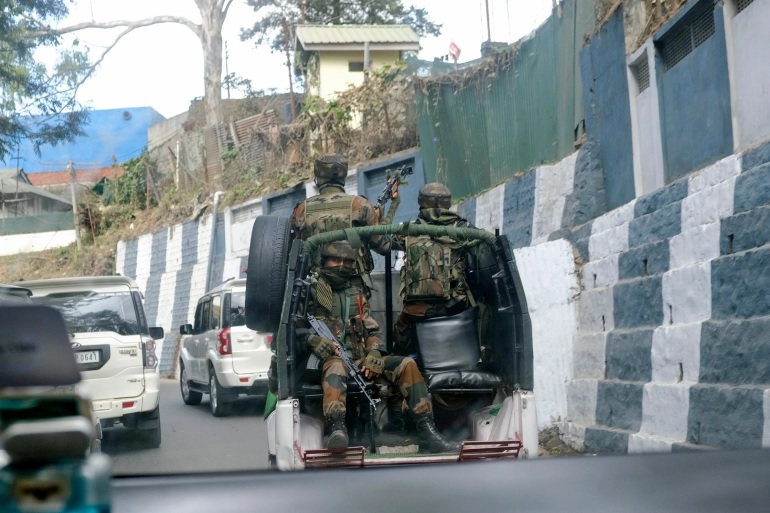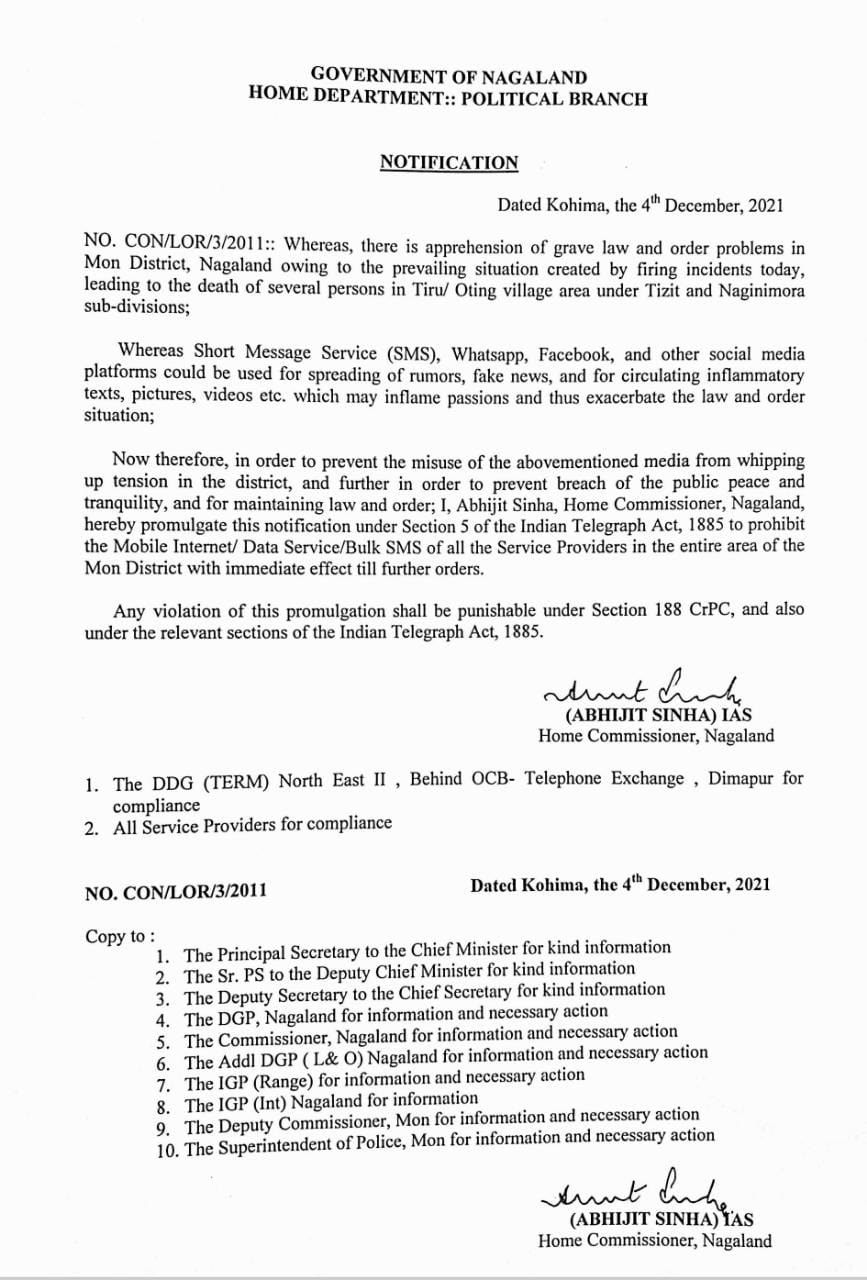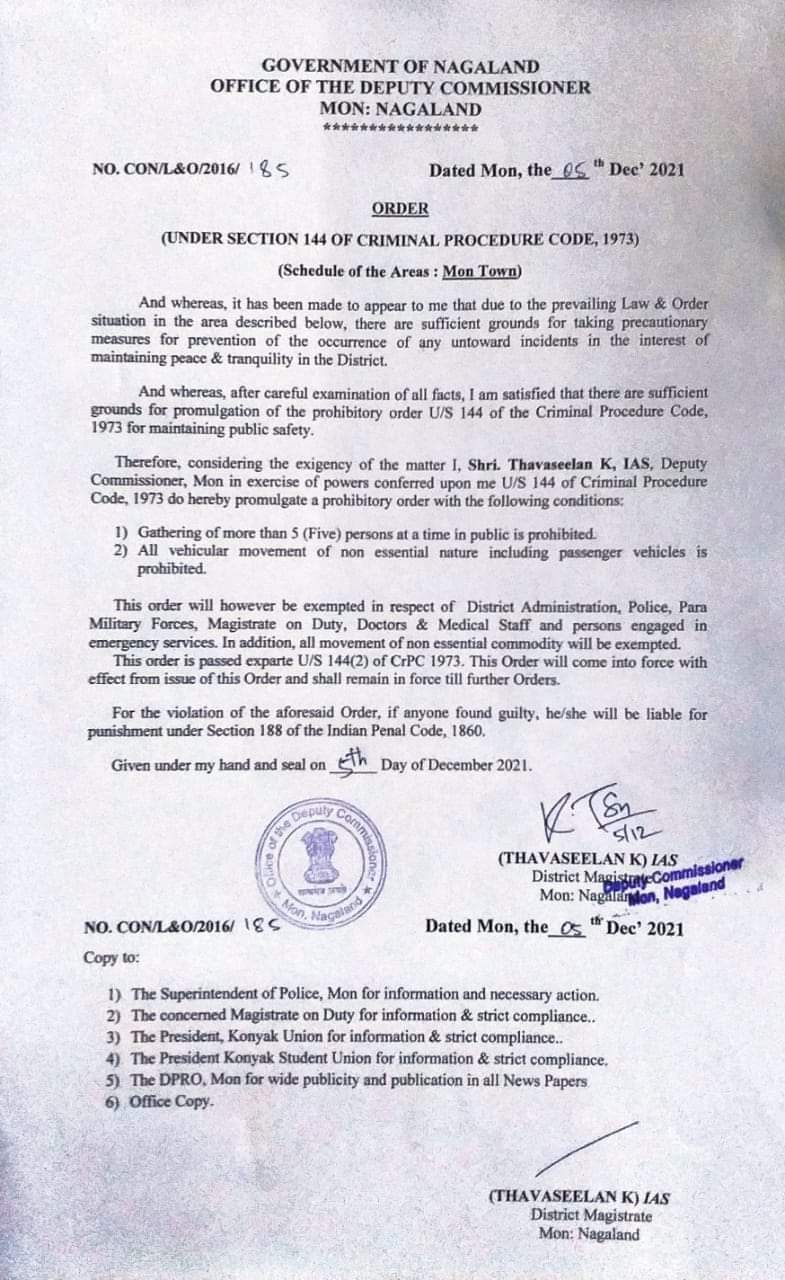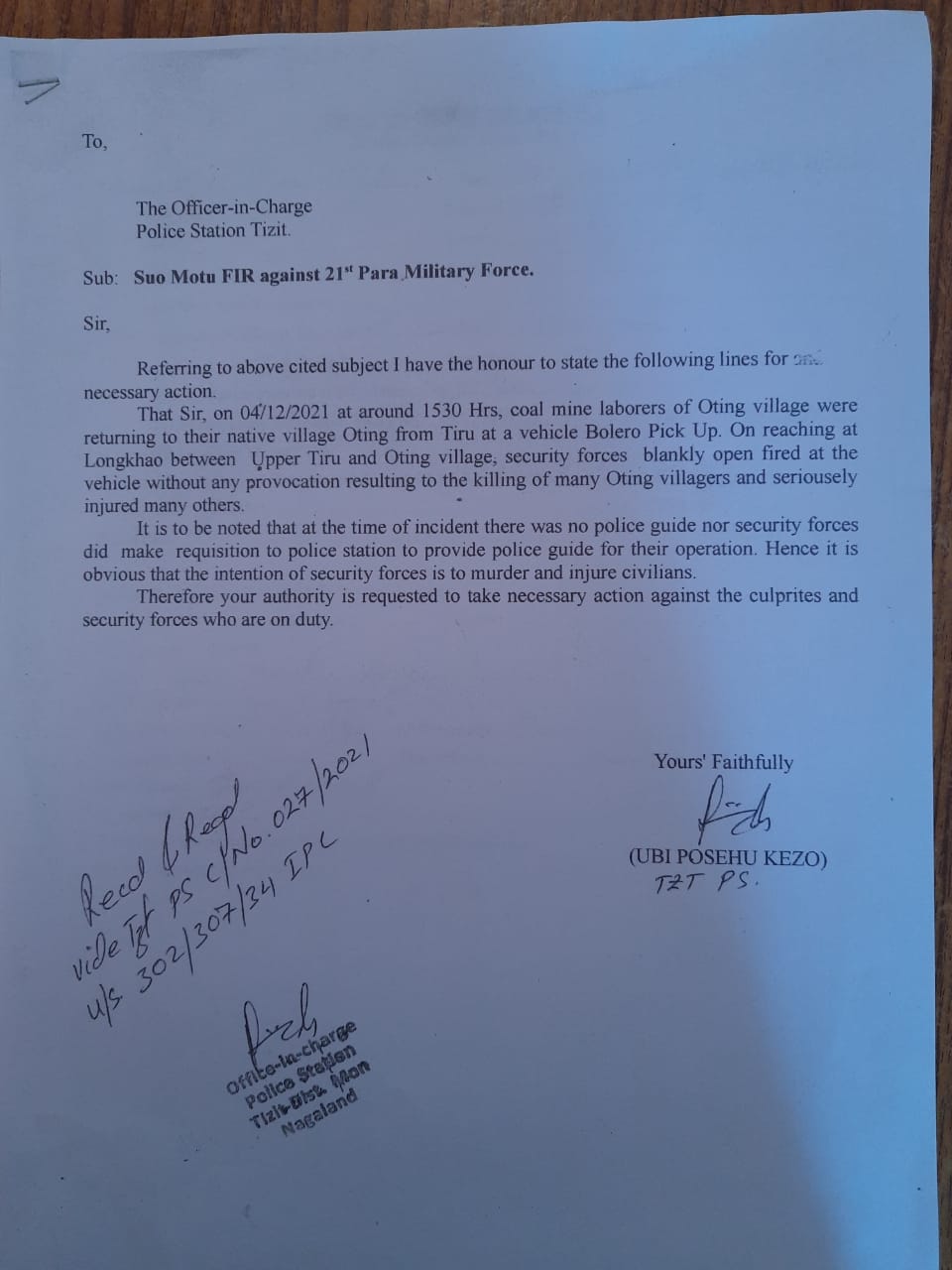
Image: Yirmiyan Arthur/AP
Personnel of the Assam Rifles shot dead at least 13 people on December 4 in two interconnected incidents – the first they claimed was a counter-insurgency operation, the second was due to firing “in self defence” when people protesting the previous deaths attacked an Assam Rifles camp.
However, when it was revealed that those killed in the so-called “counter insurgency operation” were coal mine workers from a nearby village, all members of the Konyak tribe, security forces claimed they had been fed bad intel.
What happened on Saturday, December 4?
The incident took place in Mon district at a spot between Tiru and Oting villages, just about 100 kilometers from India’s international border with Myanmar. Security forces claim they were told about movement of members of the Yung Aung faction of the National Socialist Council of Nagaland (Khaplang) or NSCN-K, a separatist group that has been designated a terrorist group. On the evening of December 4, when workers at a coal mine nearby, all members of the Konyak tribe, were returning home, security forces ambushed this passing convoy and opened fire, killing six coal mine workers on the spot; two more died en route to the hospital.
Meanwhile, Oting villagers sent out search parties when the coal mine workers did not return home. Upon discovering that they had been gunned down by security forces, a violent protest broke out where Camp 27 of the Assam Rifles was attacked and some vehicles and properties owned by Assam Rifles personnel were set on fire. Here security forces opened fire in what they claimed was “self defence” and shot dead five more protesting civilians, and injured six others. One of the security forces personnel was also killed in this incident.
Blame it on “bad intel”?
After it became clear that the people killed in the operation were coal mine workers and not terrorists, the security forces offered a feeble defence of “bad intel”. The Army issued a statement saying, “Based on credible intelligence of likely movement of insurgents, a specific operation was planned to be conducted in the area of Tiru, Mon District, Nagaland. The incident and its aftermath are deeply regretted.”
But the “bad intel” story does not wash with even members of the Bharatiya Janata Party (BJP) that is in power in Nagaland. BJP Nagaland state president Temjen Imna Along, who is also the Minister for Higher Education and Tribal Affairs in the state called it “the lamest excuse” and was “tantamount to war crimes during peacetime and amounts to summary execution as well as genocide,” in a public letter signed by him, reported NDTV.
Gov’t scurries to save face
Pushed on the backfoot with such a huge faux pass in a state governed by them, BJP heavyweight and Union Home Minister Amit Shah announced that a Special Investigation Team (SIT) will be constituted to investigate the incident. But curiously internet services have been frozen under the guise of preventing the spread of fake news and misinformation. “SMS, Whatsapp, Facebook and other social media could be could be used for spreading rumours, fake news and for circulating inflammatory text, videos, pictures etc. which may inflame passions and thus exacerbate the law and order situation,” says an order passed by Home Commissioner of Nagaland, Abhijit Singha.

Prohibitory orders have also been issued preventing an assembly of five or more people.

A suo motu FIR has also been registered by the police.

Timing of the attack
The timing of the attack is most curious as it comes just as the Naga Peace talks have reached a stalemate of sorts when it comes to key elements of the Framework Agreement. Even today, the subject of a separate flag and Constitution, as well as sovereignty remain contentious. At present Indian government authorities are in talks with the NSCN (IM) i.e the Issac-Muivah faction of the NSCN to finalise a peace agreement.
The shooting also comes in the middle of the famous Hornbill festival, that is a huge celebration of tribal culture in the North Eastern state. Six Naga tribes, led by the bereaved Konyak tribe, have now withdrawn from the festival, where a candle-light vigil was held at the festival grounds Kisama Heritage Village on Sunday night. Black flags were also flown from the Morungs (traditional huts of different tribes) at the site of the Hornbill Festival. Similar vigils have been reported from many other small and large cities and towns like Phek.
“While expressing deep sorrow and sadness over the indiscriminate firing by Indian security force where more than 10 daily wage laborers from Oting village were blatantly killed, the Eastern Nagaland Peoples’ Organisation (ENPO) vehemently condemn the barbaric act of the security force,” said the ENPO in a statement. Urging withdrawal of six Naga groups from the Hornbill Festival, ENPO further said, “Meanwhile, in the interest of the 6 tribes the ENPO declares hours of mourning, and further request all the 6 tribes under ENPO to abstain from participation in the ensuing Hornbill Festival with immediate effect till the funeral is over. Further request to hoist black-flag in all Morungs of the 6 tribes at Kisama.” ENPO clarified, “It has to be understood by all concerned that this order/move is not against the State Govt., but to show resentment against the security forces who have committed this heinous crime, and to show solidarity of the 6 tribes.”
The Ao Senden, a major group of the Ao tribe, has called for a total Bandh in Nagaland on Monday. Many students’ groups have also condemned the violence against the innocent mine workers. These include the Naga Student Federation, the Naga Hoho, the Kuki Student Organisation, the Sumi Hoho, the Rengma Hoho, the Zeliangrong Students’ Union, and many others.
Demand for repeal of AFSPA
Many tribal groups have also demanded the immediate repeal of the Armed Forces Special Powers Act (AFSPA), a draconian act that permits security forces to operate with little or no regard for human rights in the area.
The AFSPA has been in effect in the North East since 1958, while Nagaland became an Indian state in 1963 and has thus remained under AAFSPA for close to sixty years. AFSPA allows security forces to conduct operations anywhere and arrest anyone without a warrant. It has been condemned by many rights groups and most famously by human rights defender Irom Sharmila for its misuse by security forces to commit excesses, abuse and human rights violations.
In fact, scrapping the AFSPA was one of the key demands of the draft framework agreement to maintain peace in the region signed between the National Socialist Council of Nagaland (Isak Muivah) and the government interlocutor RN Ravi in 2015. However, the act was not withdrawn.
In January 2021, the Ministry of Home Affairs (MHA) has declared the entire state of Nagaland as a “disturbed area” for six more months under the Armed Forces (Special Powers) Act (AFSPA), 1958. This was extended by six more months at the end of June 2021, and is therefore effective till December 31, 2021.
Meghalaya Chief Minister Conrad Sangma, whose National People’s Party is in an alliance with the BJP, has also called for the repeal of AFSPA.
AFSPA should be repealed
— Conrad Sangma (@SangmaConrad) December 6, 2021
Political reactions
The firing and the feeble non-apology have also drawn sharp criticism from various political quarters as well as civil society groups.
This is heart wrenching. GOI must give a real reply.
What exactly is the home ministry doing when neither civilians nor security personnel are safe in our own land?#Nagaland pic.twitter.com/h7uS1LegzJ
— Rahul Gandhi (@RahulGandhi) December 5, 2021
Worrisome news from #Nagaland.
Heartfelt condolences to the bereaved families. I pray for the speedy recovery of those who were injured.
We must ensure a thorough probe into the incident and ensure that all victims get justice!
— Mamata Banerjee (@MamataOfficial) December 5, 2021
Such brutality, especially from security forces, in a civilised society where we all yearn for peace and tranquility is most unfortunate. My deepest condolences to the bereaved families of the 13 souls lost. And wishing a speedy recovery to those injured. 2/2
— TR Zeliang (@TRZeliang) December 5, 2021
Killing scores of home bound working youths in Oting in #Nagaland by the #SecurityForces is unacceptable @DefenceMinIndia. Demand enquiry and fair measures of healing @rajnathsingh pic.twitter.com/sp3SL09s4W
— Pradyut Bordoloi (@pradyutbordoloi) December 5, 2021
Deeply saddened by the unfortunate loss of lives at the firing incident in Nagaland’s Oting. My deepest condolences to the bereaved families. I pray for speedy recovery of those injured and peace to be restored ??@Neiphiu_Rio
— Conrad Sangma (@SangmaConrad) December 5, 2021
Related:
MHA declares entire Nagaland ‘disturbed area’
Turmoil in the North East: Where are the Naga Peace Talks headed?
Nagaland steps one step closer to lasting peace
Turmoil in the NE: The Naga Pact and its ramifications
